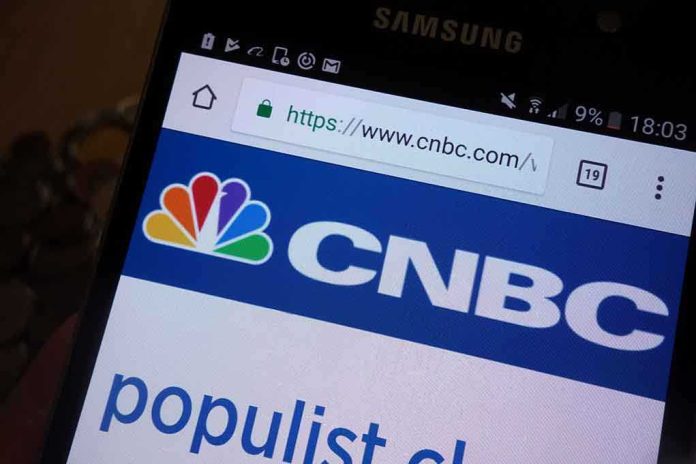
When a president brands a late-night host as “a truly deranged lunatic,” the line between political theater and entertainment war blurs into a spectacle the public cannot help but watch.
Story Snapshot
- Donald Trump publicly attacked Seth Meyers, labeling him “the least talented person to ‘perform’ live in the history of television.”
- Trump’s criticism targeted Meyers’ “100% ANTI TRUMP” stance and his technical commentary on military technology.
- The clash underscores a long-running feud between political figures and late-night television hosts.
- Media coverage amplified the controversy, fueling debates over bias, legality, and the role of entertainment in politics.
Trump’s Verbal Offensive and the Stage of Late-Night Politics
Donald Trump’s public condemnation of Seth Meyers on November 1, 2025, reignited a familiar type of controversy. Trump described Meyers as “a truly deranged lunatic” and “probably illegal,” questioning both his talent and his legitimacy as a media commentator. Trump claimed to have watched Meyers’ show “for the first time in years,” only to find the experience so distasteful that he felt compelled to broadcast his criticism. The president’s statement targeted Meyers’ perceived lack of talent, his “100% ANTI TRUMP” bias, and what Trump saw as irrelevant coverage of military technology—specifically, electric catapults on aircraft carriers. For Trump’s supporters, the attack was a defense against unfair media portrayal; for critics, it represented another attempt to discredit dissenting voices in entertainment.
Trump’s remarks did more than just insult Meyers personally; they highlighted a broader strategy. By labeling late-night hosts as “deranged” and “probably illegal,” Trump positioned himself as a victim of biased media while simultaneously rallying his base. The timing of his comments coincided with ongoing public statements and political activities, suggesting a calculated effort to dominate the news cycle and polarize public opinion. Meyers, whose “A Closer Look” segment frequently scrutinizes Trump’s policies, became a focal point for Trump’s critique of mainstream media. The specificity of Trump’s attack—down to Meyers’ discussion of aircraft carrier technology—demonstrates Trump’s willingness to challenge both content and character, blurring the lines between policy debate and personal vendetta.
The Historical Echo: Media, Comedy, and Political Conflict
Trump’s feud with late-night television is neither new nor isolated. Throughout his political career, he has repeatedly targeted media figures, journalists, and entertainers whom he perceives as unfair or hostile. Late-night hosts like Meyers, Stephen Colbert, and Jimmy Kimmel have become fixtures in the cultural critique of Trump-era politics, using satire and analysis to dissect policy and personality.
Meyers, in particular, has cultivated a reputation for incisive political commentary, often zeroing in on Trump’s statements and decisions. The November 1 incident is part of a larger pattern in which Trump uses public attacks to challenge the credibility of his critics and assert his narrative. For viewers, these confrontations have become a recurring feature of the late-night landscape—a blend of entertainment, opinion, and cultural commentary.
This ongoing battle raises questions about the role of comedy in political discourse. Should entertainers wield such influence over public perception? Is satire a legitimate form of critique, or does it risk crossing into political activism?
For American conservatives, Trump’s approach aligns with longstanding concerns about media bias, echo chambers, and the erosion of common sense in public debate. At the same time, the spectacle itself—presidential tweet storms, televised monologues, and viral video clips—reflects the changing nature of political engagement in the digital age. The public, confronted with dramatic statements and rapid-fire rebuttals, finds itself both entertained and unsettled by the blurred boundaries between politics and performance.
Controversy, Amplification, and the Limits of Legitimacy
Media outlets quickly reported Trump’s comments, fueling a cycle of coverage that amplified both the controversy and the underlying tensions. Entertainment and political news platforms documented Trump’s direct quotes, scrutinized his rationale, and debated the implications of his claim that Meyers’ anti-Trump stance was “probably illegal.” This assertion, while not supported by legal precedent or constitutional interpretation, served to dramatize the stakes of the confrontation.
Meyers and NBC faced public scrutiny, forced to weather another round of criticism from a prominent political figure. Trump’s supporters and detractors interpreted the incident through their respective lenses, deepening the polarization that has come to define contemporary media consumption.
The long-term impact of such incidents is difficult to quantify. On one hand, the controversy may increase viewership for Meyers’ show, drawing curious audiences eager to witness the fallout. On the other, it reinforces Trump’s adversarial stance toward mainstream media and entertainment, potentially shaping public perception of both the president and the host.
The absence of independent fact-checking, expert analysis, or statements from Meyers and NBC limits the scope of available information, leaving important questions unanswered. As the story reverberates through social media and news platforms, it becomes a case study in the power of public statements, the fragility of reputations, and the enduring appeal of spectacle in American political life.
Sources:
Showbiz411: Trump Attacks Seth Meyers




